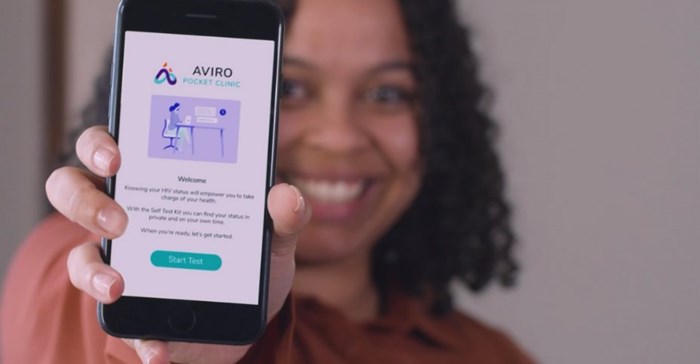
Top stories
More news

















Services available through digital channels have been shown to increase convenience and privacy and to increase access in other industries, take mobile banking as an example, but have been slow to be adopted in health.
To address this, South African start-up, Aviro, has launched a ground-breaking digitally enabled service that will transform the way in which users interact with healthcare providers in both the public and private sectors. Called Aviro Pocket Clinic, the service has already been successfully used by 50,000 people since its soft launch last year and has received an endorsement by the National Department of Health based on its success.
The digital platform allows patients to privately, conveniently and confidently manage their own care while still being connected to health providers, and is an entirely new approach that can transform the diagnosis and management of HIV and Aids.
Despite having the world's largest ARV programme with free treatment to all, recent statistics show that South Africa's HIV infection rate is, in fact, rising and the country continues to have the highest number of people living with HIV and Aids in the world.
Too many South Africans were already not finding it easy to access testing and treatment, and this has further deteriorated during the Covid-19 pandemic when few wanted to visit health facilities. It is a pressing challenge to provide better improved access to healthcare services for everyone.
Enter Aviro Pocket Clinic with its innovative solution. Built with accessibility as the top priority, this multi-language digital service walks patients through self screening, and prompts appropriate and practical next-steps for medical checks like a personal HIV test and counselling.
"The healthcare system is not currently set up to provide interventions that enable healthcare workers to support patients with remote self-testing or to give referrals to those who need clinical care," says Aviro Health CEO, Dr Musaed Abrahams.
"We are supporting healthcare providers with an e-health solution that's been specifically developed to provide efficient, user-friendly and equitable access to healthcare. This is a complete patient self-care solution that will dramatically improve the capacity of the health system to manage patients and their data without a health worker present. All this while ensuring patients have the available information to aid in their effective self-care. This will be transformative for the many people in Africa who have struggled to gain access to quality healthcare."
The service is free to patients and is made available through partnerships with health providers in both the public sector (those linked to The Department of Health and NGOs) and in the private sector (insurers and pharmacies). Its uptake is from partners who see value in patients more effectively managing their own care, while still ensuring that there is epidemiological data and in-person support as needed.
To help health workers to integrate Pocket Clinic into their care delivery, Aviro provides health staff with training, communication materials, and simple digital tools that help them to initiate, monitor, track and support their patients, while the automated platform handles most of the interactions with the patient.
For the patient, Pocket Clinic is accessed either online at home (through a WhatsApp chatbot or free website) or, if the user doesn't have a mobile device (or privacy) at home, via tablet-equipped booths at key locations like clinics or pharmacies. Pocket Clinic takes users on a step-by-step journey through their self-care options that includes delivery of medicine, diagnostics, or automated counselling and links them to the in-person digital services they require.
The service is supported by AI-enabled interactions, but, where the automated service falls short, consultations with healthcare professionals are arranged. This is an example of technology making it possible to reach more people than the traditional healthcare system can alone. This empowers users to connect to a wide range of testing, treatment, and support services directly, putting them in control of their personal health.
"During our soft launch, we saw that the service is already delivering very positive results. For example, in KZN we found that 7.5% of testers using the service tested positive for HIV and started on ARVs, compared to 2.5% in traditional clinic-based testing," says Aviro COO and co-founder, Luke Shankland.
"In a population as vulnerable as ours, that's a huge stride in accessibility of testing, diagnosis and treatment, and we are driven to scale it up to reach 10 million people in sub-Saharan Africa in the next five years."
Abrahams and his team are deeply committed to proving that automation can improve outcomes in healthcare, and point to the fact that Pocket Clinic has been validated by three leading universities, namely Johns Hopkins, Wits and UCT.
"At Aviro, we've harnessed the power of data, connectivity and behavioural science to build a service that helps people understand health pathways and take practical steps that enable them to care for their health. We envisage a world in which everyone has access to medical information and to healthcare that is efficient and delivered with empathy and understanding."